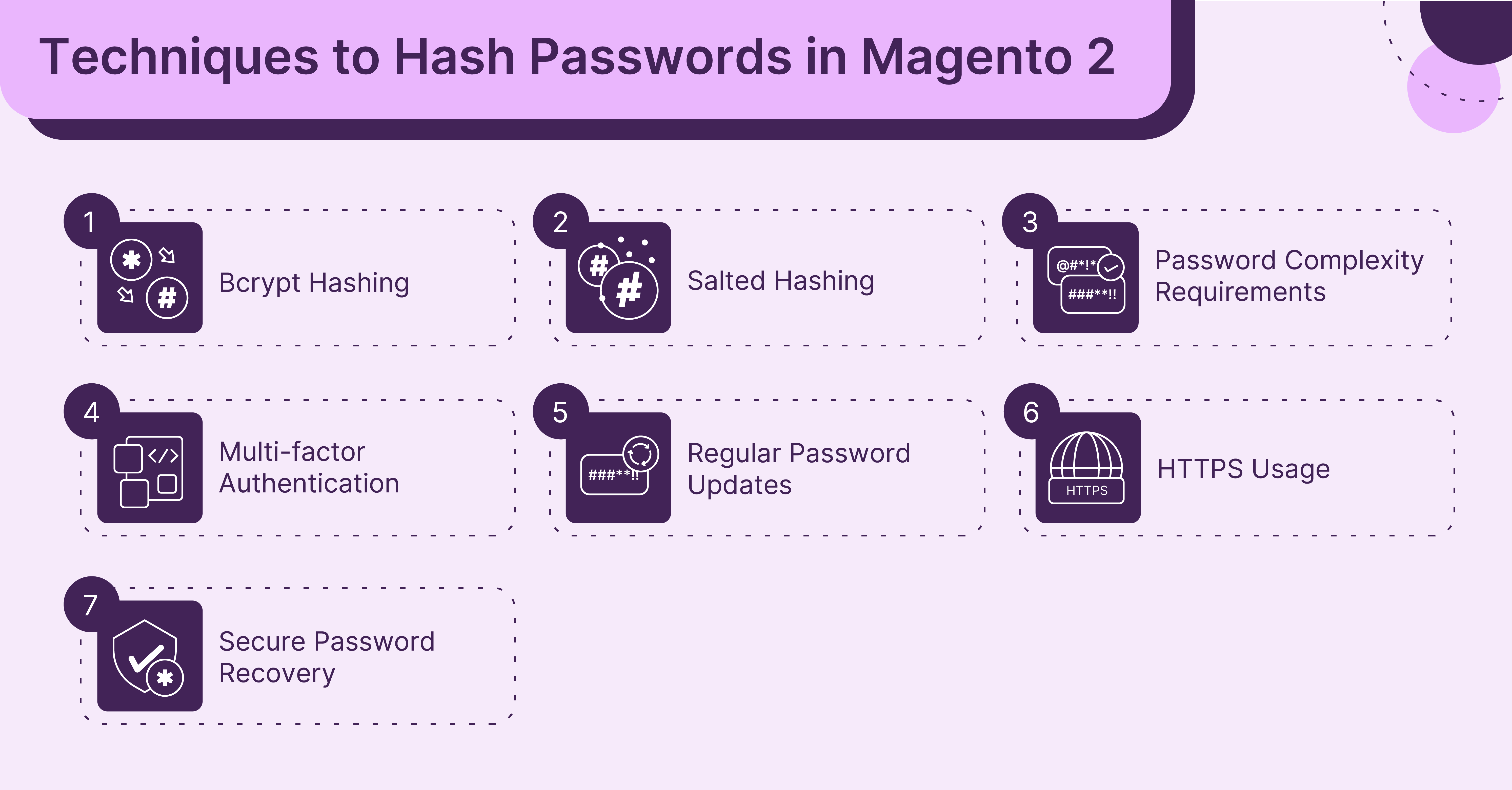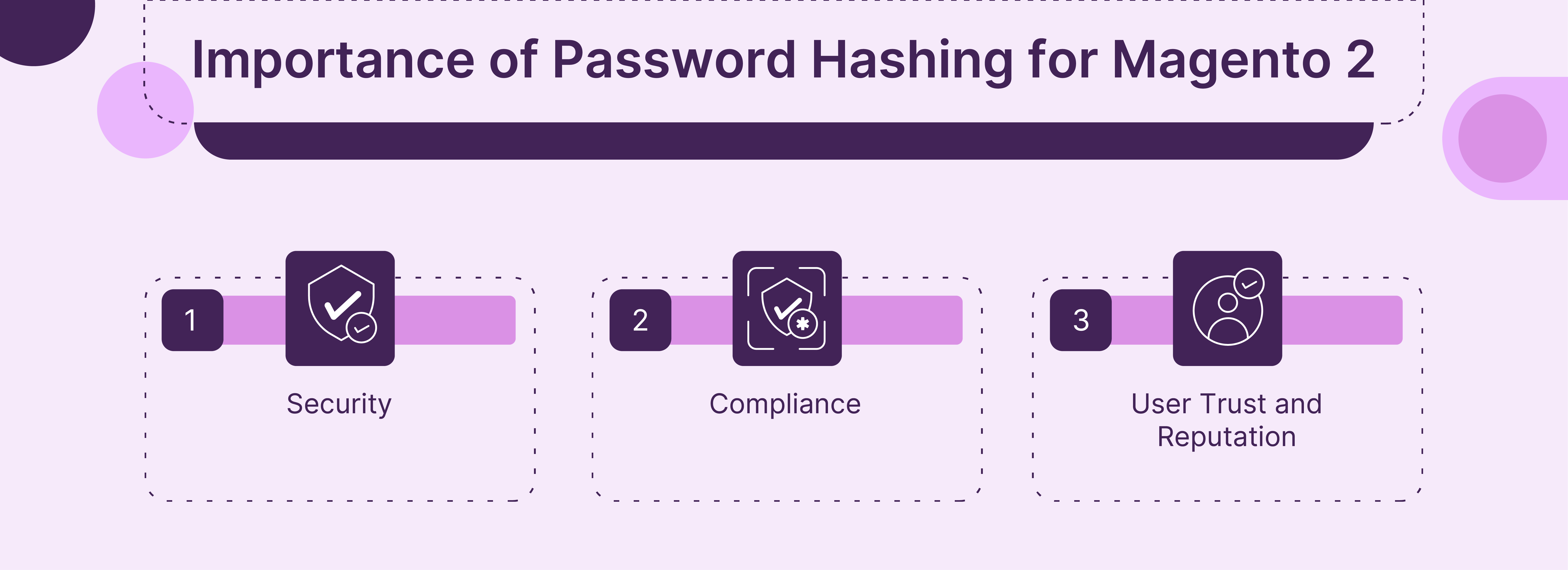
Magento 2 Password Hash: Secure Customer Passwords
Want to secure your Magento 2 store from cyber threats? Magento 2 password hashing techniques like bcrypt and salted hashing can enhance your store's defenses. This article covers the different techniques and the importance of password hashing for Magento 2.
Key Takeaways
-
Understand the significance of password hashing in Magento 2 for enhancing store security.
-
Learn about bcrypt hashing and salted hashing techniques employed by Magento 2.
-
Discover techniques like multi-factor authentication and password complexity requirements.
-
Recognize the benefits of Magento password hashing in compliance with data protection regulations.
-
Differentiate between password hashing, encryption, and plaintext storage methods.
What is Magento 2 Password Hash?

Password hashing mechanism is used by Magento 2 to store user passwords in its database securely. It involves converting plaintext passwords into irreversible cryptographic hashes before storing them.
It ensures that attackers cannot retrieve original passwords even if the database is compromised. Magento 2 employs the bcrypt hashing algorithm. It is a widely accepted and secure method for password hashing.
Magento 2 stores the customer password hash in a database that typically consists of multiple components:
-
The bcrypt hash
-
The cost factor used in the bcrypt algorithm
-
The salt.
This combination ensures robust protection against various password-based attacks.
Techniques to Hash Passwords in Magento 2

1. Bcrypt Hashing
Bcrypt is a popular cryptographic hashing algorithm used by Magento 2. It is known for its security. It is designed to be slow and computationally intensive. This makes it resistant to brute-force attacks.
2. Salted Hashing
Magento 2 automatically adds a random salt to each password before hashing. It ensures that each hash is unique, even for the same password.
This helps enhance the security of your Magento 2 store. Salting prevents attackers from using precomputed rainbow tables to crack passwords.
3. Password Complexity Requirements
Magento 2 enforces strong password policies, including:
-
A minimum length
-
Combination of uppercase and lowercase letters
-
Numbers
-
Special characters.
It ensures that users choose passwords that are difficult to guess. It allows administrators to configure password strength requirements according to their security policies.
4. Multi-factor Authentication (MFA)
Magento 2 encourages or enforces the use of multi-factor authentication for additional security. It requires users to provide two or more forms of authentication to log in to their accounts. The MFA methods supported by Magento 2 include:
-
Google Authenticator
-
Authy.
5. Regular Password Updates
Magento 2 encourages users to change their passwords periodically. The Magento 2 store admins are provided with options to force users to change their password after a certain period. It reduces the likelihood of a compromised code remaining usable for an extended period.
6. HTTPS Usage
HTTPS encrypts data transmitted between a user's browser and the web server. It ensures the confidentiality and integrity of sensitive information, including passwords.
Magento 2 site should enable HTTPS, especially for authentication and account management pages. It helps prevent attackers from intercepting sensitive data.
7. Secure Password Recovery
Password recovery mechanisms should be implemented securely to prevent unauthorized login. It involves verifying the user's identity by sending a password reset link to their registered email address or phone number. These links should be time-limited and securely generated to prevent them from being hacked.
Importance of Password Hashing for Magento 2

1. Security
Password hashing protects user passwords in case of a data breach. Attackers can easily access passwords stored in plaintext or using weak encryption methods.
Hashing ensures that even if the database is compromised, the actual passwords remain hidden.
2. Compliance
Many data protection regulations require organizations to protect sensitive information like passwords. It includes GDPR and PCI DSS.
Using strong hashing algorithms is often a requirement for compliance with these regulations.
3. User Trust and Reputation
Security breaches result in financial losses and damage to reputation and trustworthiness. Customers expect their personal information to be handled securely. Prioritizing password hashing helps Magento 2 enhance user trust.
It also fosters a positive reputation among its customer base. This, in turn, contributes to customer retention and loyalty.
How Password Hashing Differs From Other Password Storage Methods
| Aspect | Hashing | Encryption | Plaintext Storage |
|---|---|---|---|
| Reversibility | The password cannot be reversed back to plaintext. | It requires a decryption key to convert ciphertext back to plaintext. | The password is stored exactly as the user entered it. |
| Security | It is highly resistant to brute-force and rainbow table attacks. | It provides high security if implemented properly. Also, if the encryption key is securely managed. | It does not protect unauthorized access. |
| Salting | It allows for the incorporation of salts. These are random values added to passwords before hashing. It enhances security. | Salting is less commonly used in encryption scenarios than hashing. It typically involves symmetric or asymmetric keys. | Pla... |
| Usage | It is primarily used for securely storing passwords in databases. | It is commonly used for secure data transmission over networks. It also protects sensitive data at rest. | It is not suitable for password storage in secure systems. |
| Key Derivation Functions | It incorporates key derivations to increase the computational cost of hashing and for added security. | They use key derivation techniques. These are not applied specifically to password storage scenarios. | Key derivation is not applicable. |
| Computational Cost | It can be computationally intensive. Especially when using secure hashing algorithms and key derivation functions. | Encryption and decryption operations may incur computational overhead. | No computational overhead for storing passwords. |
FAQs
1. What happens if I need to migrate passwords from a different system to Magento 2?
When migrating passwords, you must ensure compatibility with the hashing algorithm. You may need to convert the passwords from their original format (e.g., MD5) to bcrypt before importing.
2. How can I verify a password against the stored hash in Magento 2?
To verify a password against the stored hash in Magento 2, you can use the password_verify() function provided by PHP. This function compares a given password with its hash counterpart stored in the database and returns a boolean value.
3. Does the password hashing mechanism change with different versions of Magento 2?
The password hashing mechanism in Magento 2 remains consistent across different versions. It is recommended that you stay updated with the latest version to ensure security patches and enhancements.
4. What role does the encryptor play in managing passwords in Magento 2?
The encryptor class handles encryption and decryption tasks, including password hashing. It abstracts the underlying implementation details. This makes it easier to manage password-related operations securely.
5. How should I handle password hashing during Magento 2 upgrades?
During Magento 2 upgrades, the password hashing mechanism typically remains unchanged. It is advisable to review any changes in the upgrade documentation or release notes.
Summary
The Magento 2 password hash technique converts plaintext passwords into irreversible cryptographic hashes before storing them in the database. This article also covered several other points, including:
-
Magento 2 utilizes security measures, including strong password complexity requirements and MFA.
-
The importance extends to compliance with data protection regulations and safeguarding user reputation.
-
It differs from encryption and plaintext storage in terms of reversibility, security, and computational cost.
-
This technique protects Magento 2 stores against cyber threats and maintains user trust.
Want to enhance the performance of your Magento store? Consider our managed Magento hosting for fast speed and robust security.



